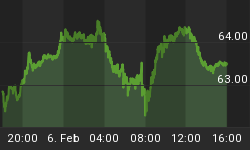Many investors still hope that the global economy will experience a significant rebound in 2013. I guess it is human nature to assume the optimistic position that our economic fate will turn to the upside with each new calendar.
In fact, a Bloomberg poll of 862 global investors taken this month showed that 66 percent of respondents believe in a stabilizing or improving global economy, compared to just over 50 percent in September. The survey also indicated that the world economy is in its best shape in 18 months as China's prospects improve and the U.S. looks likely to avoid the Fiscal Cliff.
In sharp contrast, I believe the temporary illusion of global stabilization has come from a massive increase in public sector debt, artificially-produced low interest rates that can never be allowed to increase and central bankers that have taken their cue on how to conduct monetary policy from Gideon Gono (Governor of the Reserve Bank of Zimbabwe).
If the politicians and bureaucrats in Japan, Europe and U.S. allowed their private sectors to deleverage, if they did not interfere with the correction of asset prices, if they allowed insolvent institutions to go bankrupt, and if they did not abuse their currencies and interest rates; then they would indeed be on a sustainable and free-market based pathway to prosperity.
However, because they have the collective hubris to believe recessions can be expunged from the business cycle, what we do see is the empirical evidence of a government-induced mediocrity in the developed world, which will only lead to a severe downturn in the GDP in the near future.
If the current strategies deployed led to economic prosperity, then international lenders would not have to undertake yet another bailout for Greece. The nation already defaulted on €172 billion worth of Greek bonds, which represented 85.5% of the total €206 billion held by the private sector in the early part of 2012. However, just this week they again had to restructure their debt by cutting the interest rate on official Greek loans, extending the maturity of those loans from the EFSF bailout fund by 15 years to 30 years, and be granted a 10-year interest repayment deferral on those loans.
Turning to China, if government spending was the solution, then the Shanghai composite index would not be down 20% in 2012 and now be trading at a four-year low. Also, if central bank counterfeiting from the ECB was the answer, Spain's stock market would not be down 6% for the year. And if the U.S. was indeed rebounding after a multi-year recession, why is the S&P 500 down 4% since the end of this summer--especially in the light of the fact that it has not gained one point from the level it was five years ago?
If the global economy was about to make a turn to the upside, then industrial commodity prices would presage a rebound in growth. But instead copper prices are down from close to $4.00 per pound in February, to just $3.60 today. Oil prices were trading close to $100 a barrel in the summer and have sold off to just $88 today. If the global economy was about to make a significant move to the upside, why haven't industrial commodities and equity markets begun to price in that improvement--especially in consideration of the massive amount of liquidity that has been added by central banks?
The truth is that the Great Recession was the result of too much debt, rapid money supply growth, asset bubbles and artificial interest rates. Governments believe the economy can be remedied by placing all those conditions on steroids. They are wrong, and when falling real interest rates finally cause investors to demand a real rate of return on their holdings of government paper the game will be over.
In an effort to maintain the illusion of prosperity, politicians on both sides of isle will ensure that the Fiscal Cliff and Debt Ceiling in the U.S. will be avoided at all costs. Any retracement in government borrowing of the Fed's phony money will send the economy into a steep recession. That's because the main borrower of Bernanke-Bucks has been Uncle Sam. If our fiscal imbalances are suddenly and sharply reduced then the money supply would shrink, which would send asset prices and the economy tumbling. And then the mirages of economic stabilization and improvement would rapidly vanish away.
Therefore, the developed world will continue to be mired in stagflation, not only next year but indeed until those governments are finally forced into addressing the real underlying economic problems.















